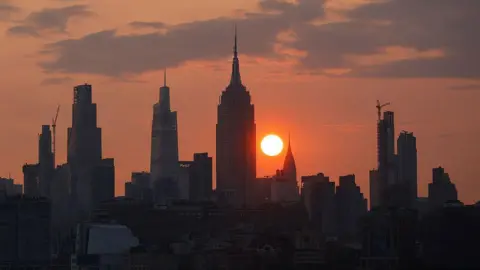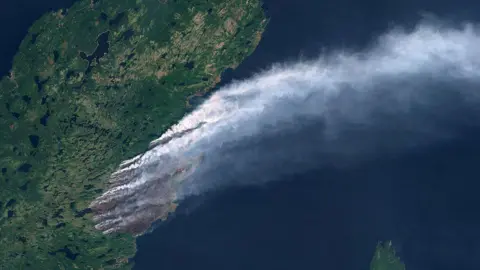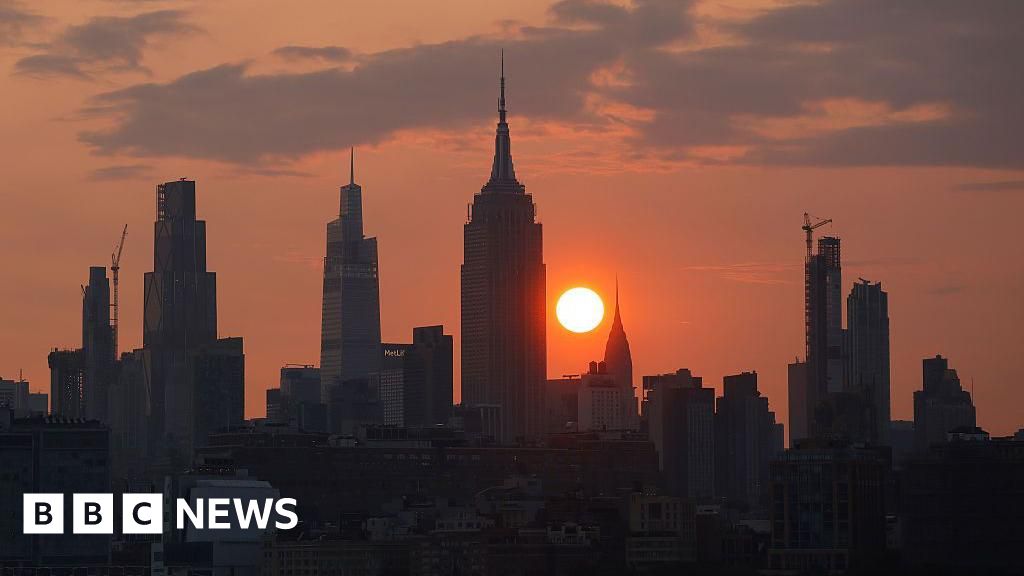Nadine YousifSenior Canada reporter
 Getty Images
Getty ImagesAs deadly wildfires raged in the Canadian province of Manitoba this summer, Republican lawmakers in nearby US states penned letters asking that Canada be held accountable for the smoke drifting south.
“Our skies are being choked by wildfire smoke we didn’t start and can’t control,” wrote Calvin Callahan, a Republican state representative from Wisconsin, in a letter dated early August.
Callahan, along with lawmakers from Iowa, Minnesota and North Dakota, filed a formal complaint with the US Environmental Protection Agency (EPA) urging an investigation into Canada’s wildfire management.
Manitoba premier Wab Kinew quickly condemned the move, accusing the lawmakers of throwing a “timber tantrum” and playing “political games”.
By August, the wildfires had scorched more than two million acres in Manitoba, forced thousands to evacuate, and killed two people – a married couple who authorities said were trapped by fast-moving flames around their family home.
As September draws to a close, data shows that 2025 is on track to be Canada’s second-worst wildfire season on record.
A study published in the Nature journal in September has revealed that smoke from Canada’s wildfires has also had far-reaching, fatal consequences. It estimates that the 2023 wildfires – the country’s worst on record by area burned – caused more than 87,500 acute and premature deaths worldwide, including 4,100 acute, smoke-related deaths in the US and over 22,000 premature deaths in Europe.
Wildfire smoke contains PM2.5 – a type of air pollution – that is known to trigger inflammation in the body. It can exacerbate conditions like asthma and heart disease, and, in some causes, can damage neural connections in the brain.
“These are big numbers,” said Michael Brauer, a professor at the University of British Columbia who co-authored the study. He added the findings show wildfire smoke should be treated as a serious health issue, akin to breast cancer or prostate cancer.
For some American lawmakers, the blame falls squarely on Canada.
“Canada’s failure to contain massive wildfires,” Callahan wrote in August, “has harmed the health and quality of life of more than 20 million Americans in the Midwest.”
Their complaints raise the question: Could Canada be doing more to curb its wildfires – and by extension, their smoke?
Climate and fire experts in both countries told the BBC that the answer is largely no.
“Until we as a global society deal with human-cased climate change, we’re going to have this problem,” said Mike Flannigan, an emergency management and fire science expert at Thompson Rivers University in British Columbia.
 Gallo Images/Orbital Horizon/Copernicus Sentinel Data 2025
Gallo Images/Orbital Horizon/Copernicus Sentinel Data 2025Metrics show Canada’s wildfires, a natural part of its vast boreal forest, have worsened in recent years. Fire season now starts earlier, ends later, and burns more land on average. The 2023 fires razed 15 million hectares (37 million acres) – an area larger than England – while the 2025 blazes have so far burned 8.7 million hectares (21.5 million acres).
As of mid-September, there are still more than 500 fires burning, mostly in British Columbia and Manitoba, according to the Canadian Interagency Forest Fire Centre.
Roughly half of Canada’s wildfires are sparked by lightning, while the rest stem from human activity, data from the National Forestry Database shows. Experts warn that hotter temperatures are making the land drier and more prone to ignition.
Wildfires are not only worsening in Canada. The US has recently seen some of its most damaging blazes, including the 2023 Hawaii wildfires that killed at least 102 people, and the Palisades fire in January, the most destructive in Los Angeles history.
Both countries have struggled to keep pace, often sharing firefighting resources. Canadian water bombers were deployed in California this year, while more than 600 US firefighters travelled north to assist Canada, according to the US Forest Service.
In Canada, strained resources – and worsening fires – have fuelled calls for a national firefighting service. Wildfire emergency response is currently handled separately by each of the provinces and territories.
“The system we have right now worked 40 years ago. Today? Not so much,” argued Mr Flannigan.
Others propose controlled burns, a practice used in Australia and by indigenous communities, as a solution, though these fires would still generate smoke. Some argue for better clearing of flammable material in forests and near towns, or investing in new technology that can help detect wildfires faster.
Some of that work is already underway. In August, Canada pledged more than $47m for research projects to help communities better prepare for and mitigate wildfires.
 Getty Images
Getty ImagesStill, experts like Jen Beverly, a wildland fire professor at the University of Alberta, warn there is little Canada can do to prevent wildfires altogether.
“These are high intensity fire ecosystems” in Canada, she said, that are different from fires in Australia or the US. “We have very difficult fires to manage under extreme conditions, and we’re seeing more of those because of climate change.”
With a warmer climate, Prof Beverly said attention should be paid to pollution. She noted that the US is the second-worst carbon emitter in the world behind China. “I mean, we should be blaming them for the problem,” she argued.
In recent months, the Trump administration has also rolled back environmental policies designed to reduce emissions, and has withdrawn the US from the Paris climate accords.
Sheila Olmstead, an enviromental policy professor at Cornell University, noted that Canada and the US have a history of cooperation on pollution and climate, including an air quality agreement signed by the two in 1991 to address acid rain.
“It was a very clear framework for addressing the problem, and that’s what seems to be missing here,” Olmstead told the BBC. Both countries, she said, would benefit from working together on wildfires instead of trading blame.
As for the EPA complaint, it is unclear what the agency could do to address the US lawmakers’ concerns. In a statement to the BBC, the EPA said it is reviewing it “and will respond through appropriate channels”.
Prof Brauer said the data in his study shows that even though the fires are burning in Canada – often in remote areas – their impact can reach far beyond.
The findings, he told the BBC, call for a re-framing of how the consequences of climate change are understood.
“The effects of a warmer climate are localised, and there are winners and losers,” Prof Brauer said. “But this is an illustration that some of these impacts are becoming global.”
He argued that the US lawmakers’ complaints are an “unfortunate distraction,” and that the focus should instead be on collaboration and learning how to “live with smoke”.
“This stuff isn’t going away,” Prof Brauer said, adding that there are ways to prevent future deaths if there is a will to adapt.




